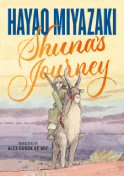 “Shuna’s Journey” is a parable about societies that lose control of what sustains them. In this case, as one might expect of Hayao Miyazaki, what’s lost is a connection to the natural world, particularly to agriculture.
“Shuna’s Journey” is a parable about societies that lose control of what sustains them. In this case, as one might expect of Hayao Miyazaki, what’s lost is a connection to the natural world, particularly to agriculture.
The main and titular character, Shuna is a prince from a village in the periphery whose people have retained this connection, living impoverished agrarian lives. He desires a better life for his people, but unlike the manhunters and city dwellers seen elsewhere who live in symbolically lifeless deserts and enrich themselves with the labor of slaves stolen from the periphery, Shuna understands that that life must come from the natural world — from the fruits of agriculture. He seeks a better cereal crop, the golden grain that sustains the city, shipped in husked and lifeless from the land of the gods. A journey through geological time into that land proves surreal and, almost literally alien, full of lavishly illustrated horrors and wonders that Shuna only escapes with the aid of slaves he freed previously in his journey.
The story is a striking tale of courage and renewal. Despite the fact that it wears its origin as a Tibetan folk tale on its sleeve, Miyazaki’s identification of the source of modern energy, modern lifeless society — our “golden grain” — in the life force of natural epochs past is a powerful and thoughtful image that ties together movements for environmental protection, worker’s rights and decolonization.
If there is something lacking in this image, it is the modern analogue of Miyazaki’s hero, Shuna. We ourselves cannot journey through geological time to gain control of the golden grain, so Miyazaki’s tale leads us to no clear path of future action to save our world.
Three words that describe this book: imaginative, thought-provoking, breath-taking
You might want to pick this book up if: you loved Miyazaki’s work on the film “Princess Mononoke” which evokes many of the same themes in a far more historically and geographically grounded narrative.
-Shane
This reader review was submitted as part of Adult Summer Reading. We will continue to share reviews throughout the year.


